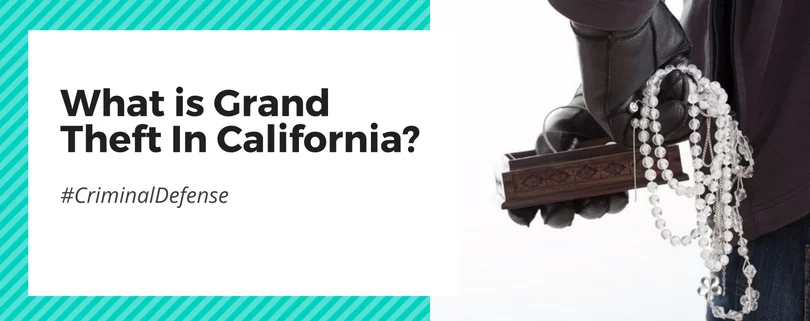What Is Grand Theft In California?
Grand theft in California may be charged as either a misdemeanor or felony depending on the value of the property stolen and your criminal history.
The state of California considers grand theft a major crime.
If you are accused of grand theft, you will be given the opportunity to defend yourself against the claim and will not necessarily be convicted of grand theft if you develop a strong defense.
The most common defensive strategies involve building a case around intent, the claim of right, and consent.
In order to build a strong defense, you need to seek the help of an experienced defense attorney. This will increase your chance of successfully defending yourself against the claim and avoid being charged with either a misdemeanor or felony.
We can help connect you with the right theft attorney in the San Fernando Valley.
Before we get started, let’s take a closer look at what graft theft actually is in California so you have a better understanding.
What Is Grand Theft In California?
According to Penal Code 487, Grand theft is defined as the unlawful taking of another’s property without their consent and with the intent to steal that property.
Grand theft covers a wide range of property, including the following:
- Money, property or labor with a value over $950
- Farm products like fowl or crops with a value over $250
- Agricultural or ocean products taken from a research facility with a value over $250
- Labor, property or money taken by an employee from his/her direct employer over a 12-month period with an aggregate value of over $950
- Property taken from another person when it is a car, horse or another farm animal, or firearm, regardless of value
Examples of Grand Theft
Grand Theft Auto is a real crime. So is embezzlement which is the unlawful taking of something entrusted to a person, as in spending company money on personal items.
Larceny is defined as the physical taking and carrying away of another’s property with the intent to steal it. Examples would be the taking of something from another person’s yard or shoplifting in a store.
Tricking someone is also considered grand theft. If someone rents a car and then sells it, this is a “trick” crime.
False pretense is a grand theft crime. It occurs when someone tricks another into turning over both possession and ownership of a property. If an art dealer tells a customer that a painting in her living room is not an original and buys it for $100, but knows it is really worth millions, he has committed grand theft through false pretense.
Grand Theft vs. Petty Theft
Petty theft is a more common crime and involves stolen property with a value of $950 or less. The property was not taken directly from another person (such as robbery or mugging). And the item was stolen was not an automobile or firearm.
Shoplifting of items valued $950 or less would be considered a theft by larceny. Petty theft is determined when someone takes possession of property owned by someone else without his or her consent with the intention of removing it from his or her possession.
Penalties for Grand Theft
Grand theft penalties can include both fines and jail time. In California, grand theft is a “wobbler” offense. It can be charged with either a misdemeanor or a felony. The charge depends on the facts of the case and the defendant’s criminal history.
A misdemeanor is punishable by up to one year in county jail. A felony can result in up to three years in California state prison. Theft of a firearm is an automatic felony and counts as one strike on a defendant’s record.
There are also several additional penalties possible, called “sentence enhancements.” These are additional time penalties that depend on the circumstances involved such as the value of the property taken. For example:
- Property taken exceeds $65,000, time added is one year
- Property taken exceeds $200,000, time added is two years
- Property taken exceeds $1.3 M, time added is three years
- Property taken exceeds $3.2 M, time added is four years
Grand Theft Defenses
Being charged with grand theft does not mean an automatic conviction. There are defenses to the charges. A prosecutor must prove every element of the offense, the most important of which is intent.
There are two basic defenses for grand theft in addition to the lack of intent: claim of right and consent.
Claim of right is the defense that the defendant believed that he was entitled to the property. If that was his sincere belief, then there was no crime of grand theft.
However, there are two exceptions. This claim cannot be asserted if the defendant concealed the taking of the property either at the time it happened or later when the taking was discovered. And the claim cannot be used if the property were illegal (firearms or drugs, etc.).
Consent is the claim that the owner of the property gave his or her consent to the defendant to take it. But the law also says that if there were consent, the defendant must have acted within the scope of the consent.
Having returned the property is not considered a valid defense for grand theft. But forgetting to return it could be valid because it shows the lack of specific intent to steal.
Are you in search for a certified attorney to represent you?
Let us help you find one today!



